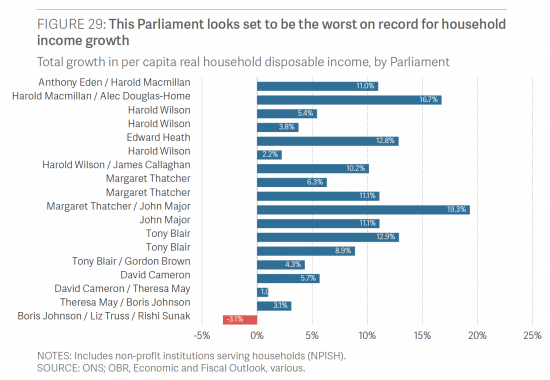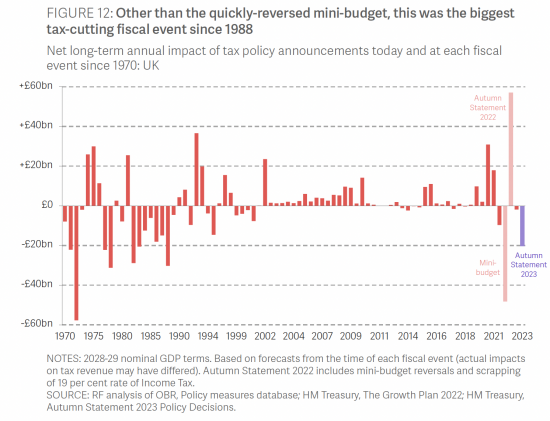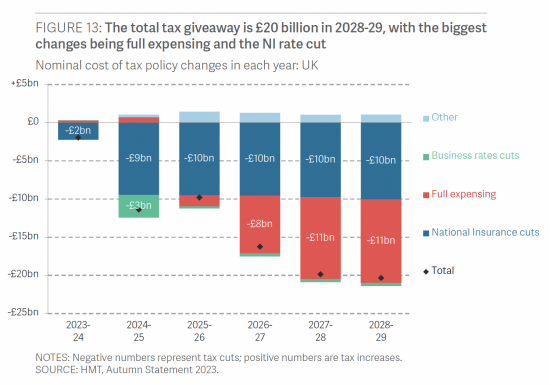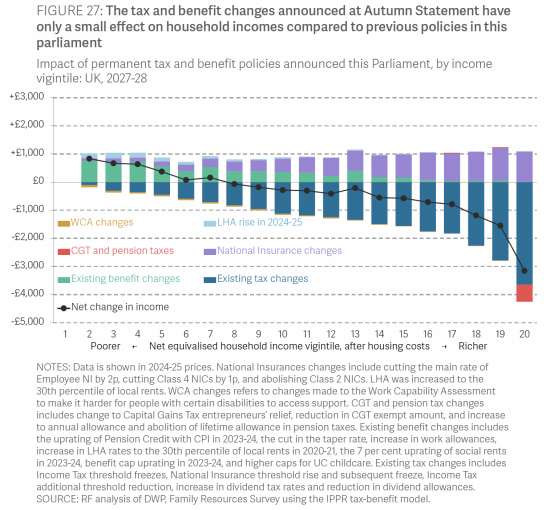Having had two opportunities to sleep on the autumn statement, I admit to having worked this morning in a state of greater despair than I did yesterday, and my mood was not good then.
As the FT notes, this was a giant exercise in booby-trapping Labour and leaves them (and us) with a giant economic problem to address.
As the FT also notes, the Resolution Foundation has reported that the average UK household is £1,900 worse off than it was as a result of the actions of this government.
The Resolution Foundation itself produced this chart:

We are in unknown territory with this government.
This is despite the Resolution Foundation confirming this:

However, as they added:
The biggest beneficiary was, then, big business - but not for several years to come as yet, to totally scupper the next government. You simply cannot make up stupidity of this sort.
This chart was also very good:

Changes have been progressive but, as ever that is only because benefit changes have helped the least well-off. The focus on tax does not help them nearly as much, and it is vital that this be recalled. Note, too, that the national insurance change is anything but progressive.
It is not, however, the detail that is troubling me about all this - troubling as it is. It is the absence of ideas that terrifies me.
The Chancellor treated the autumn statement as an opportunity to play games. That was the overriding message. There was nothing really of substance to tackle any known issue of concern in this budget. It almost totally ignored the green agenda, for example. Instead, it was just the chance to set up arrangements to make life difficult for Labour. To describe that as pathetic is to be overly generous to him.
And Labour's response has been dismal.
Rachel Reeves has backed the cruel attack on people with disabilities as if to signal that she, too, will be callous in office.
The £28 billion spending plan for a Green New Deal has been forgotten. It is rarely mentioned these days, and I very strongly suspect that is because it has been dropped and not just because the Tories love to attack it.
There has been no counter-attack from Labour that I have noticed, or which has achieved any news prominence. The attack lines have all been by think tanks and journalists.
And a great deal is still not being said. There will be terrible austerity if Labour sticks to these plans. I am sure Wes Streeting will be delighted. No wonder Labour has spent so much time sucking up to business.
Throughout it all, there is a horrible acceptance that paying out vast sums in debt interest to make the wealthy richer than they already were is a totally appropriate thing for the government to do, even though there is not a shred of economic justification for paying almost anything now (a subject I might get to in another post this morning if I have time).
That last point hints at my real concern. I feel deeply angry that throughout all this, there is an acceptance that this is how things must be. There is no demand for new thinking. There is no suggestion that there might be an alternative. What is very clear is that no one is trying to write one. There is a need for a new meta-narrative, based on theory, that explains that we can do so much better than this, and have to if we are to survive. And yet it is simply not out there.
As I wrote in The National yesterday, addressing this theme:
This morning I have an overwhelming feeling that Scotland needs another plan. To be candid, I think the UK as a whole shares that need. The trouble is, no one has got close to writing it. What I have, somewhat reluctantly, asked myself as a result is whether or not I can now avoid having a go at writing that plan. After all, how much worse do things have to get before I am left with no choice but give it a go?
I am inundated with work right now. The Taxing Wealth Report 2024 is not quite complete and needs to be pulled together. University demands are quite high at this moment. There is a potential new tax project to work on. But is it time to write the plan to get us out of this mess? Have I produced enough thinking to suggest such a thing?
I have learned that I should only write books when I think there is a need to do so, having done one once to commission that I did not enjoy, and having tried to do so again a year or two ago. I have a feeling though that this might be the time to write a book of my choice. It may have no impact at all. But when we are in such a dire place, and there is no sign that anyone is suggesting we can do anything but sink ever deeper into the mire of neoliberal failure, doesn't it have to be worth a try?
Thanks for reading this post.
You can share this post on social media of your choice by clicking these icons:
You can subscribe to this blog's daily email here.
And if you would like to support this blog you can, here:



Richard, please write it!
It will be a matter of finding time
How can we help?
I don’t know yet
But please do shout out if there is something the “cloud brain” can help with!
🙂
For what it is worth, I would suggest caution at writing the plan. I suspect you may not have the range of support and resources to hand (human, financial, access to all the latest data and modelling). I can see the downsides. I am less certain of the upsides. Of course i may be wrong, but I wanted to share my doubt.
To be clear, I am not sure either
I am trying to work out what to do
I think your efforts have increasing traction. Elsewhere I mentioned your media impact, and given the nature of Huw Pill’s (BoE) FT interview, and the near collapse of the Conservative Party as the number and scale of manifesto failures pile up, I respectfully suggest your efforts are beginning to bear fruit. Giving yourself distractions, with a greater burden of work – which you acknowledge may be overwhelming – seems to me unfortunate, given the recent turn in events.
Forgive my blunt approach; but now? That was my first intuitive response.
Why not?
Why not?
The Conservative-Neoliberal consensus forged with the FPTP electorate is collapsing in front of our eyes. The new is yet to be born; but the circumstances, the economic and political framework is likely to be very unstable, and may change very quickly in surprising ways difficult to foresee, or plan. This is politics, and the people making big decisions have proven poor judgement; I think that is a fair comment, on the evidence.
Of course, I may wrong …… (but you did ask).
I hear you
And I was genuinely asking
I wonder if the people who need to read your putative book would read it ? Somehow I doubt it. The political movers and shakers know what they are doing (or think they do, however much we hate their thinking). And people who don’t engage with politics certainly won’t.
I suspect you wouldn’t match the influence you have using current channels.
On the other hand maybe you need to write the book to pull all your thoughts together and formulate ‘the plan’. You can only do so much (and it’s already a lot). You need to be fairly sure it will be the best focus for your effort.
Agreed
The alternative is to write it here and then publish it
My thoughts exactly Richard.
Some of the most influential books I read in my formative years were usually in the sf/fantasy genre. There were others, but, and it a big but, they were about the politics of societies, empires and social interaction.
Firstly Issac Asimov’s Foundation Trilogy. Basically Gibbons Rise and Fall of the Roman Empire brought up to date. Also Charles Dickens.
The point is though that both writers wrote weekly/ monthly in magazines or for public reading, it was oribginally piecemeal. However when they brought the various parts together into book form they created something special.
I’m sure you can do that too with you’re vast catalogue of writing, and I’m sure there is a ready army of advisors to point to bits even you have overlooked over time.
I doubt that though, reading the above makes me think your subconscious has already done that for you.
Anyway, good luck whatever you decide.
It is years since I rest Asimov – maybe 45 or more
Ditto Gibbons
And I only read a bit of Dickens. I preferred Trollope – some of which is quite radical.
But your idea is sound
If you write it here bit-by-bit, much of the slog of proof-reading and sub-editing will be done for you FOC by the army of readers/commentors who follow your blog and any points of contention may be resolved through the inevitable ensuing debates.
Agreed
I would like to think that Labour’s response to this Autumn Statement and its behaviour over the last three years is their equivalent of Muhammad Ali’s rope-a-dope strategy i.e. offer nothing except a hard to hit defensive posture, let your opponent exhaust themselves throwing punches, knock them out in the eighth round.
It worked for Ali against the bigger and much stronger George Foreman.
For Labour stages one and two are working, but even if they win the next election I do not see the big knockout that will finally rid this country of the ruling Oligarchy who have crippled our development since the 1970s.
https://dpac.uk.net/2023/11/press-release-disabled-people-not-coasting-on-benefits/
This is disabled people’s response, a better one than that from the labour party.
Totally appropriate
A reminder of what a foul place this country is.
Might get you on a few late night talk shows, enabling you to get your points across to a broader audience than usual. You’ll have to become a ‘sleb’ 🙂
🙂
https://transformpolitics.uk/
A new party of the left which, appropriately after that DPAC article, is having its inaugural meeting tomorrow in Sheffield. I wish they’d chosen a different name. It’s too close to Reform which is Tice’s party.
Write it we will do our best to spread it. If possible bullet points as a forward, to make it easier to spread and understand.
Therev are a lot of bullet points already….
I’d suggest you think around how to have the maximum impact rather than the maximum output. Lobbyists like me (in the past) do this. Who can we link up with or form a group with to share the load and have more impact. Call the working group something sexy. That works with media and politicians! Cross sectoral working groups are even better.
I tried with things like the Progressive Economy Forum, a supposedly left wing group that is actually dedicated to neoclassical thinking
It’s hard to find genuine kindred spirits
I can in tax and academia but not on altermative economics
Loneliness and calumny is the high price to be paid by any trailblazer.
High or worthwhile?
To what extent is Molly Scott Cato on the same page as you?
We are talking
Fairly close, but not quite the same
We have spent time talking.
The name of such a group is its most important feature. It’s how advertising works. It sets the tone, expectations, and outcomes.
It also has to be short, memorable and desirable.
Read Medhi Husan’s book “Win Every Argument”.
That’s what you want to do, right?
Is it good?
“I’m not arguing, I’m just explaining why I’m right.” —Anonymous
1. The book is good because it makes you better at what you do.
2. If that is part of your job, then you owe it to everyone who is counting on you for the right result.
3. And that includes the rule of three.
Book Contents:
PART ONE: THE FUNDAMENTALS
1. Winning Over an Audience
2. Feelings, Not (Just) Facts
3. Show Your Receipts
4. Play the Ball … and the Man
5. Listen. Don’t (Just) Speak
6. Make Them Laugh
PART TWO: TRICKS OF THE TRADE
7. The Rule of Three
8. Judo Moves
9. The Art of the Zinger
10. Setting Booby Traps
11. Beware of the Gish Galloper
PART THREE: BEHIND THE SCENES
12. Confidence Is Everything
13. Keep Calm and Carry On
14. Practice Makes Perfect
15. Do Your Homework
I would not start until I was very sure what I was saying
I am already close to that
I think why they don’t know what to do is because it’s ending, the societal model we know and live in, and they just don’t know what to do. Their corporate masters, aware without the work of serfs they have no income and the income they do have is falling, bid them increase the number of serfs in work. Since the serfs, in ever growing numbers, are too ill to be exploited the incomes, of the wealthy will continue to fall away and with it will go their contributions without which political campaigns simply won’t be affordable. The politicians will fall with them then, for both the Sunaks and the Starmers. The gravy train is ending and they don’t know what to do.
So too is society as we’ve known it, which depends realistically on there being plenty of people fit and well enough to readily meet the demands of a commercial environment. That situation is changing, not least because of the age demographic before I forget, so we’re facing something a society like the one we’ve had imposed upon us has never faced before.
I don’t know what to do either except try to survive.
I think you are right
The old is dying
The new is yet to be born
(As someone once said – and yes, I know who)
It is our fate to be waiting for it to happen
Would like to see the first chart order by growth, and colour-code by political party.
There are pros and cons, but is it feasible to work with a collaborator on one of these projects to reduce the burden on you?
I wish…..
Why not approach Joseph Stiglitz? He has a fabulous reputation and carries a significant clout. He is also at the cutting edge writing about the economics of inequality.
He has foot tax very wrong right now
And he is never solution focussed, which is what is deeply annoying about his books
400 pages of griping and 10 of solutions, maybe
“But is it time to write the plan to get us out of this mess?”
Who do you suppose takes any notice of what you write?
You
Ecxcept you’re not who you claim to be
I am rereading ‘The rise and fall of the Neoliberal Order’ by Gary Gerstle. He charts how the New Deal was so persuasive that the Republicans and parties of the right in other countries had to adopt it to get elected. And how actual or perceived problems in the assertive and optimistic government action mandated by the New Deal led to it being critiqued. Neoliberalism was presented as addressing the weaknesses of New Deal, and in its turn became the only game in town. So that decisive steps in entrenching neoliberalism were taken not by Republicans but under Clinton.
Gerstle claims that neoliberalism was seen to fail in Iraq, when there was no plan for reconstruction because the misplaced faith was that private enterprise would sort things out. And then 2007/8 started putting nails in the coffin.
If he’s right neoliberalism is running on fumes (sadly fumes only rise, like wealth). And the time is ripe for a convincing account of what comes next.
If there is no narrative there is no way out of this mess
But I have spent the day writing a Masters course
I often wish someone could come up with a powerful drama which presents a positive narrative of a sustainable future – or a sort of Sliding Doors comparison of where we are heading against what could be possible. Dramas can reach audiences in a profound way – remember Cathy Come Home. Of course nowadays we don’t have the experience of all watching simultaneously and sharing reactions at the coffee break the next morning. Plus the difficulty of getting such a thing funded let alone broadcast. Even “I, Daniel Blake”, for all its power, didn’t manage to make a widespread impression.
I’m not a dramatist. I know that.
Meanwhile across the Atlantic, Biden is doing his version of a Green Deal and a whole lot more, including taking on some of the big tech based monopolies. As a result the US is doing extraordinarily well in terms of employment, wages, growth, despite its political and other problems and the threat of Trump.
He has taken on neoliberal, leave it to the market economics on head-on, upending their assumptions. And it’s working. Starmer and co could be using this to make the case for doing something similar.
But people are not giving him the credit for it
You are my light at the end of the tunnel… please carry on.
We desperately need people like you!
It is obvious to many people that we cannot carry on as we are.
Without adequate constraints, the great sucking machine of capitalism has delivered uncountable wealth to a tiny number of people, and penury to millions. It is obvious that resources are not allocated to deliver the basics that all people need – food, water, education, healthcare, decent work, homes, safety, freedom, wellbeing. And the voodoo science of neoclassical economics, built on lies, has no answer to the existential threat that is anthropogenic global warming.
Frankly I despair of us finding a peaceful transition to a more equitable and sustainable disposition. Without it, there is likely to be civil disorder and war and drought and famine and pestilence and mass migration and repression and death and suffering on a horrible scale. But I suppose one must have hope, because the alternative is too bad to contemplate.
How do we arrange society to deliver the necessities of life so we can all survive and thrive, within the boundaries of our planet’s resources?
That is what ‘The Plan would be about.
I share all your concerns.
Surely you have already put many of the ideas out there in the Economics of a Green New Deal? I used them at a recent local Compass meeting and also Mariana Mazzucato’s rendition https://www.nature.com/articles/s41893-021-00828-x#rights link that shares many similar ideas about public finance.
In my view the Institute for Innovation and Public Purpose is the best hope we have in the UK of changing narratives and thinking about public value, the role of government, government management and evaluation approaches, alternative economics etc. https://www.ucl.ac.uk/bartlett/public-purpose/ucl-institute-innovation-and-public-purpose. One reason is that it is explicitly what it was set up to do. Another is Mazzucato being so good at collaborating and framing issues in non confrontational terms.
I also note they have some big grants from the Hewlett Foundation’s Economy and Society programme https://hewlett.org/programs/economy-and-society/ set up to explore alternatives to Neoliberalism: ‘Neoliberalism—the free-market, anti-government, growth-at-all-costs approach to economic and social policy—has dominated policy debates in the United States and much of the world for the last half century. But it has outlived whatever usefulness it might once have had, and today its free-market fundamentalism causes more problems than it solves.’ They are funding ideas across the ideological spectrum (that include some ‘interesting’ organisations such as American Compass!)
Also just came across this article that challenges Labour’s lack of new ideas with reference to the inflation act https://www.newstatesman.com/spotlight/economic-growth/2023/10/inflation-reduction-act-global-economy-britain-biden
And this interesting analysis of the inflation reduction act, which concludes: ‘If there is one lesson to be drawn from the Inflation Reduction Act, it’s that passing major legislation through a closely divided Congress will often require self-contradiction. The bill is a devil’s bargain, but if it were ideologically pure, it would also be a dead letter. That’s no justification for making misleading statements about the bill’s contents, as top Democrats unfortunately have. But a clear-eyed view of the bill’s achievements and shortcomings serves to emphasize the fact that here, as elsewhere, the perfect and the good are enemies. Thankfully, the good appears to have won out this time.’ https://slate.com/news-and-politics/2022/08/inflation-reduction-act-congress-manchin-climate-tax-health.html
The theory exists
But have we got the story right yet?
I am not convinced as yet.
Robert J. Shiller talks about “narrative economics”: it’s the story that enables an idea to viral.
We need to find the phrase that takes us from greednomics to greenonmics.
Sources
☑️ Narrative Economics: How Stories Go Viral and Drive Major Economic Events, https://amzn.eu/d/1NyqRA7
☑️ Review @ LSE https://tinyurl.com/bp8ftsmt
☑️ “Training the MMT trainers”, Module 3: Framing and Language (page 45) https://tinyurl.com/25cjufnc
Thank you
A suggestion to be discussed:
Rather than attempting the Herculean task of creating a singular narrative perhaps an edited book of essays would be a possible way forward.
Considering each capitalist nation state has different historical and cultural traditions which interact with and structure their politicians and economics, maybe pairing up with the American economist Robert Reich and asking others in other countries to contribute their particular to place ideas would lead to an interesting collegiate effort out of which common solutions and a possible narrative could be created.
The trouble is that edited books of essays usually sell 15 copies outside libraries
Your blog probably gets more readers than most book. Another consideration is a film, but it is not cheap.
Consider the following (listing does not imply endorsement):
❌Finding the Money (MMT) https://findingmoneyfilm.com/
❌Oh, Jeremy Corbyn…the Big Lie https://www.platformfilms.co.uk/
❌The Great NHS Heist https://vimeo.com/ondemand/thegreatnhsheist
❌The Anatomy Of A Witch Hunt (Starmer’s Labour Party purge) https://www.youtube.com/watch?v=cnPbVO5HA4o
They have worked for tax.
But doing one takes enormous effort.